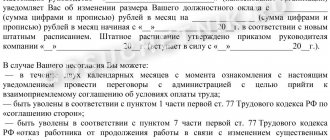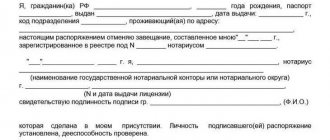1. Amendments and termination of the contract are possible by agreement of the parties, unless otherwise provided by this Code, other laws or the contract.
A multilateral agreement, the execution of which is related to the implementation of entrepreneurial activities by all its parties, may provide for the possibility of changing or terminating such an agreement by agreement of both all and the majority of persons participating in the specified agreement, unless otherwise provided by law. The agreement specified in this paragraph may provide for the procedure for determining such a majority.
2. At the request of one of the parties, the contract can be changed or terminated by a court decision only:
1) in case of a significant violation of the contract by the other party;
2) in other cases provided for by this Code, other laws or agreement.
A violation of the contract by one of the parties is considered significant, which entails such damage for the other party that it is significantly deprived of what it had the right to count on when concluding the contract.
3. Invalid as of June 1, 2015. — Federal Law dated 03/08/2015 N 42-FZ.
4. A party that is granted the right to unilaterally change the agreement by this Code, other laws or an agreement must, when exercising this right, act in good faith and reasonably within the limits provided for by this Code, other laws or an agreement.
- Article 449.1. Public bidding
- Article 450.1. Refusal of the contract (execution of the contract) or the exercise of rights under the contract
Is it possible to change the terms of an employment contract?
Changes to the essential terms of the employment contract (Labor Code of the Russian Federation, Article 72) are carried out upon the conclusion of an additional agreement between the employer and the employee, which becomes an integral part of the working agreement.
Both the employer and the employee have the right to initiate them. Changes to the terms of the employment contract determined by the parties are allowed when they do not infringe on the rights and do not reduce the level of guarantees to employees in comparison with those established by labor legislation.
Changes in the essential terms of the employment contract occur:
- at the will of the employee;
- at the will of the employer;
- for reasons that do not depend on the wishes of the parties.
Chapter 12 of the Labor Code of the Russian Federation defines a list of circumstances under which an existing employment contract can be edited:
- transfer to another unit with the consent of the employee;
- changes to the contract due to changing working conditions;
- new owner of the enterprise;
- removal of a person from performance of official duties.
What circumstances are not considered significant?
Judicial practice demonstrates the reluctance of arbitrators to change the terms of agreements between the parties. Even financial difficulties, which, according to the plaintiffs, are grounds for terminating contracts, are recognized in court as “immaterial circumstances.” Below is a list of reasons that the court recognizes as insufficient for terminating/amending a contract under Article 451 of the Civil Code of the Russian Federation:
- a sharp deterioration in the financial condition of one of the parties to the agreement: the Presidium of the Supreme Arbitration Court of the Russian Federation in its Resolution No. 9600/10 dated November 30, 2010 in case No. A17-1960/2009 indicated that this circumstance could have been foreseen;
- the consequences of inflationary processes: as well as an unstable financial condition, the parties could have foreseen and calculated in advance the impact of rising prices, the Presidium of the Supreme Arbitration Court of the Russian Federation considered when issuing Resolution No. 1074/10 of April 13, 2010 in case No. A40-90259/08-28-767;
- financial crisis: all economic entities and individuals find themselves in crisis conditions, therefore it is an objective and not a significant circumstance. For this reason, challenging the terms of the contract according to the provisions of Article 451 of the Civil Code of the Russian Federation is unacceptable, states the Presidium of the Supreme Arbitration Court of the Russian Federation in Resolution No. 4876/01 dated 08/07/2001;
- bankruptcy of the creditor (bank, other lending entity): such a situation cannot be considered as a significant circumstance, since the creditor had the opportunity to take measures to save his financial condition (Resolution of the Presidium of the Supreme Arbitration Court of the Russian Federation dated January 25, 2000 N 6058/99 in case N A51-11215 /98-17-250);
- the presence in the contract of a clause on the grounds for changing the fee: the parties have provided for possible changes, and the law does not allow challenging them (for example, if the contract provides for the possibility of increasing costs, the buyer of an apartment will not be able to challenge the agreement due to an increase in its cost - Resolution of the Presidium of the Supreme Arbitration Court of the Russian Federation dated 18.02 .1997 N 1852/96 in case N 2-872);
- an increase in operating costs for maintaining the housing stock: the parties could and should have foreseen such a situation, as well as stipulated it in the contract, notes the Presidium of the Supreme Arbitration Court of the Russian Federation in Resolution No. 1654/96 dated March 4, 1997. The absence of such a rule is not a reason for terminating the contract;
- theft of the leased asset: the theft could have been foreseen and its possible consequences for the parties stated, the Presidium of the Supreme Arbitration Court of the Russian Federation states in Resolution No. 15800/09 dated March 16, 2010 in case No. A40-47834/08-155-376. At the same time, the judges remind that the state independently resolved this situation with the help of Federal Law dated October 29, 1998 N 164-FZ “On financial rent (leasing).”
Changing the terms of the employment contract at the initiative of the employee
An employee may consider that the agreement concluded with him requires changes. In this case, he has the right to contact the employer with a corresponding request.
The way to contact the employer is to send a statement to him, which sets out the reasons for making changes to the employment agreement, their nature, and the possible timing of their introduction. The document is drawn up in writing and registered.
After studying the application, the manager can:
- agree to changes in the contract;
- refuse the employee.
The employer expresses the decision in writing (with a resolution on the application or a response letter).
The manager has the right to support the employee’s proposal for changes, but is not obligated to do so. If refused, the person continues to work under the same conditions.
What are the essential conditions?
Essential conditions include provisions that are necessarily included in a government contract by virtue of direct instructions by law.
In paragraph 1 of Art. 432 of the Civil Code states that an agreement is not concluded if agreement is not reached regarding the subject of the transaction and the conditions that are named in the law or other legal acts as essential or necessary for contracts of this type, and all those conditions regarding which, at the request of one of the parties, is achieved agreement.
In Art. 34 of the Law on the Contract System states that the state contract must reflect the following conditions:
- the procedure for determining the quantity of GWS based on customer requests when purchasing with an indefinite volume;
- price;
- the final price of each stage;
- responsibility of the customer and supplier;
- procedure and terms of payment for goods, work, services;
- procedure and deadline for acceptance of GWS and registration of such acceptance of GWS;
- reducing the amount to be paid by the amount of mandatory payments (including taxes, fees) associated with payment for the contract, if they are paid by the customer to the budgets of the budget system;
- ensuring the fulfillment of obligations and the terms of return of the security deposited in money, including its part;
- the procedure and period for the provision of warranty obligations by the supplier (if a requirement for its provision is established);
- provision of new security for the fulfillment of obligations if the bank that provided the bank guarantee as security for the fulfillment of obligations has had its license revoked.
In 2021, customers who receive money from the federal budget, in cases specified in Federal Law No. 385-FZ of December 8, 2020, are required to include in the contract a provision on treasury support for targeted funds, and in some cases, on treasury support for obligations.
Read more: “How is treasury support of contracts under 44-FZ and State Defense Order carried out.”
To help customers, ready-made forms of government contracts are developed, which set out all the essential conditions. This allows you to avoid mistakes. The rules for using such forms were approved by Government Decree No. 606 of July 92, 2014. Clause 7 of this PP indicates whether it is possible to make changes to the standard contract under 44-FZ - no, customers only select from one to several list values to fill out the variable part. The permanent part of standard contracts does not change.
The letter of the Ministry of Finance No. 24-05-06/28316 dated 04/08/2020 states that data other than those offered by standard forms or standard conditions cannot be provided.
IMPORTANT!
For changing standard conditions or including additional conditions not provided for in the standard contract, the customer’s employees are fined 3,000 rubles under Part 4.2 of Art. 7.30 Code of Administrative Offences.
Read more: “Standard contracts under 44-FZ: where to find and how to use.”
ConsultantPlus experts discussed how to change government contracts without violations or fines. Use these instructions for free.
Additional agreement
If the employer agrees with the employee’s proposed change option, the parties must draw up and sign an additional agreement to the employment contract in two copies. This paper records the existing agreements. It should reflect the details of the parties, the number and place of execution, clearly state the provisions that have been changed, and indicate the date from which the agreement will begin.
Notification
If the employer needs to change the terms of the contract, he sends a proposal to the employee at least two months in advance explaining the reasons for the need to adjust previously reached agreements.
The employer must issue an order regarding the changes introduced at the end of the notice period, indicating their reasons. The document must indicate the deadline for the employee to make a final decision. Employees should be familiarized with the administrative document in writing.
It is unacceptable to put pressure on an employee, so if he refuses, the requirements remain the same.
The employer has the right (Article 72.2 of the Labor Code of the Russian Federation) to change the conditions unilaterally if:
- any natural disasters;
- industrial accidents, accidents;
- fires, floods, ice, etc.
It is permissible to change the provisions of the contract by way of a unilateral decision made by the employer when organizational or technical conditions of work change (Article 74 of the Labor Code of the Russian Federation).
How to change the subject of a contract
As a general rule, changing the subject of the contract is not allowed.
For changing it, an official will be fined 20,000 rubles, and a legal entity will be fined 200,000 rubles. And the courts recognize an additional agreement with a change in the subject of the contract as invalid.
But in Part 7 of Art. 95 44-FZ states that other goods are supplied by agreement of the parties. The main thing is that the quality and technical and functional characteristics (consumer properties) are better compared to the subject of the contract.
IMPORTANT!
The price of a government contract or the price of a unit of goods (work, service) cannot be changed in this case.
Parties may not use this basis to change the country of origin of the goods. Such a ban is enshrined in regulatory legal acts that were adopted within the framework of Parts 3 and 4 of Art. 14 44-FZ.
Here is an example of the implementation of this norm.
The employee refused changes to the contract, but agreed with the transfer
If you refuse to work under the new conditions and have consent to the transfer, the parties draw up an additional agreement providing for transfer to another position (from the list proposed by the employer).
The employer creates an administrative document on the transfer in accordance with Art. 72.1 of the Labor Code of the Russian Federation and enters information into the personal card T-2 (Resolution of the State Statistics Committee No. 1 of 01/05/2004).
What are the nuances of transferring to another job under the Labor Code of the Russian Federation?
The transfer can be temporary or permanent. It is described more fully in Art. 72.1 and 72.2, supplementing and clarifying the basic standards of the original art. 72 Labor Code of the Russian Federation.
The following should be considered temporary:
- Transfers in connection with the replacement of a temporarily absent employee for up to 1 year. If 1 year has expired, and the employee continues to work in a new place and does not ask to be transferred to the previous one, the transfer begins to be considered permanent.
- Transfers for up to 1 month due to emergency circumstances. Accordingly, it is stipulated that the employee is transferred to perform work to prevent or eliminate the consequences of an emergency (for example, an industrial accident or natural disaster). The peculiarity is that the employee’s consent to such a transfer is not required, except in cases where this work does not correspond to the level of knowledge and skills of the employee.
Permanent transfers include all other types of transfers, including to another location with the organization and to another employer. We should not forget that all of them are possible with the consent of the employee and the employer.
ConsultantPlus experts explained how to draw up an additional agreement to an employment contract on the performance of duties of a temporarily absent employee. To do everything correctly, get trial access to the system and go to the Ready solution. It's free.
The employee refused both the change in the terms of the contract and the transfer
In such a situation or in the absence of vacancies in the institution at the end of the notice period, the employment agreement is terminated on the grounds provided for in clause 7, part 1, art. 77 Labor Code of the Russian Federation.
To carry out the procedure correctly you need:
- receive an employee’s refusal (in writing) to work under new conditions;
- register it;
- offer another job;
- get rejected;
- draw up and register a notice of termination of the employment agreement;
- issue and register a dismissal order;
- familiarize the employee with it in writing;
- draw up and issue a work book;
- make due payments.
Explanations on the topic
| Main points | Document details | Download |
| The number of GWS is allowed to be increased (decreased) repeatedly, since the law does not limit the number of amendments to the government contract in these cases. The main clarification about increasing the contract by 10 percent under 44-FZ is that the new contract price should not differ by more than 10 percent from the price at which the government contract was concluded | Letter of the Ministry of Economic Development No. OG-D28-8176 dated June 20, 2016 | |
| Does the customer have the right to independently make changes to an already concluded contract based on the results of a request for quotations on the grounds that are enshrined in clause 1, part 1, art. 95 44-FZ, - no. | Letter of the Ministry of Finance No. 24-03-07/79960 dated 12/01/2017 | |
| Government customers increase the VAT rate only within the limits established for the duration of the contract. If they are not there, then they change the price of the government contract due to an increase in the VAT rate only after additional limits have been reached | Information letter of the Ministry of Finance No. 24-04-02/16837 dated March 14, 2019 | |
| Is it possible to change the place of provision of services in a contract under 44-FZ - yes, if it is not an essential condition | Letter of the Ministry of Economic Development No. OG-D28-2615 dated February 29, 2016 |
About the author of this article
Dmitry Sidaev Higher and specialized education in procurement: KhSUEP, diploma with honors in the specialty “Jurisprudence” and GAPM named after. N.P. Pastukhova, diploma with honors in the program “Procurement Management”. Author and ideological inspirer of the projects “GoodWin Project: Tenders made simple” and “Antidote 44-FZ: a cure for headaches in procurement.” Trains in procurement under 44-FZ, advises suppliers and customers, works as a guest manager of the tender department. Invited expert in many projects on public procurement.
Other publications by the author
- 2021.10.13News and changesFeatures of changes in prices for construction government contracts will be extended to geological exploration purchases
- 2021.10.06EISInstructions for unilateral refusal to execute a government contract: as amended in 2022
- 2021.09.30 Procurement control Is it possible to change the essential terms of a government contract: changes from 2022
- 2021.09.29223-FZInstructions for canceling purchases under 44-FZ or 223-FZ: what will change in 2022
Job offer
If an employee refuses to work in other conditions, the employer must offer in writing the vacant positions available in the area in accordance with qualifications. In the absence of such, the employer offers another lower-level position or work that is paid lower, and the employee is able to perform it, taking into account his state of health.
Complying with the requirements of Art. 74 of the Labor Code of the Russian Federation, the employee should be offered a list of vacancies with a name, description of responsibilities, working conditions (salary, regime). Vacancies must be offered throughout the notice period. When offering such positions, the manager does not have the right to check the business and other qualities of the employee, since the work must initially correspond to the person’s qualifications. The employer is obliged to offer positions from another locality when this is provided for in the collective agreement or labor agreement.
Legal positions of the highest courts: retroactive force of the treaty
Expert consultation
Civil legislation provides for the possibility of subsequent documentation of the actual relations between the parties. However, this design has a number of features that must be taken into account. Our expert Tatyana Slavkina, using the example of judicial acts, examined the grounds in the presence of which the validity of the agreement extends to the legal relations of the parties that arose before its conclusion.
***
By agreement between the parties, the terms of a civil contract can be applied to relations that arose before its conclusion (retroactive effect of the contract) clause 2 of Art. 425, “Civil Code of the Russian Federation”. The parties apply this condition when legal relations have already actually developed between them (for example, the use of property until the conclusion of the lease agreement), but they did not have time to conclude the agreement.
This norm has been in effect since the adoption of the Civil Code of the Russian Federation in 1994, and therefore extensive law enforcement practice has developed. It is worth noting that Federal Law No. 42-FZ dated 03/08/2015 amended paragraph 2 of Article 425 of the Civil Code of the Russian Federation, which did not significantly change the norm, but introduced specifics in terms of the fact that the effect of the norm extends unless otherwise established by law or follows from the essence of the corresponding relations.
So, as the courts tell us, based on the norms of the current legislation, the application of the condition on the retroactive validity of the contract is permissible if the relevant relations actually existed between the parties (Resolution of the Presidium of the Supreme Arbitration Court of the Russian Federation dated August 23, 2005 No. 1928/05 in case No. A40-36270/04- 25-140). In this case, introducing into the contract a provision on its retroactive effect eliminates uncertainty in the relationship between the parties.
It should also be taken into account that the presence in the contract of a condition on its retroactive effect does not affect the determination of the moment from which the contract is considered concluded and does not change the period of its validity (clause 8 of the Information Letter of the Presidium of the Supreme Arbitration Court of the Russian Federation dated 02.16.2001 No. 59 “Review of the practice of permitting disputes related to the application of the Federal Law “On State Registration of Rights to Real Estate and Transactions with It””).
As noted above, in accordance with the current edition of the Civil Code of the Russian Federation, it is impossible to apply the retroactive force of an agreement if this is contrary to the law or otherwise follows from the essence of the relationship. As an example, we can cite the Resolution of the Arbitration Court of the Volga-Vyatka District dated February 21, 2020 No. F01-7960/2019 in case No. A43-8071/2019.
The parties to this dispute entered into an additional agreement to the supply contract and reduced the payment period for the goods. The additional agreement indicated that it has retroactive effect. Thus, the parties established new payment terms, as a result of which the supplier demanded more than 500 thousand rubles in penalties. The supplier's first instance and appeal were upheld. The Arbitration Court of the Volga-Vyatka District in its ruling by the lower courts did not agree and indicated that, according to clause 1 of Art. 453 of the Civil Code of the Russian Federation, when the contract is changed, the obligations of the parties are preserved in the changed form.
In the event of a change or termination of the contract, obligations are considered changed or terminated from the moment the parties enter into an agreement on the change or termination of the contract, unless otherwise follows from the agreement or the nature of the change in the contract, and when changing or terminating the contract in court - from the moment it comes into force court decision to amend or terminate the contract (clause 3 of Article 453 of the Civil Code of the Russian Federation).
Consequently, as a general rule, a change in the contract entails a change in the corresponding obligations of the parties only for the future, and the requirement to pay a penalty in terms of fulfillment of obligations, the due date of which came on the date of conclusion of the additional agreement, contradicts this norm and the general principles of civil law.
Sometimes the parties try to challenge the provision of retroactive effect after the conclusion of an additional agreement or contract. It is not possible to challenge the terms of the retroactive force of the contract in this case if there were no objections from the parties. For example, the Arbitration Court of the Moscow District issued Resolution No. F05-14897/2019 dated 09.09.2019 in case No. A40-162646/2018, from which it followed that if an additional agreement was signed without a protocol of disagreements, then the party agreed to the effect of the retroactive provision . In the absence of evidence to challenge these provisions of the additional agreement, it cannot be declared invalid.
A similar example was considered by the Arbitration Court of the Volga-Vyatka District (Resolution No. F01-10237/2020 dated June 23, 2020 in case No. A28-5234/2018). In this case, the court decided that if the party did not send a protocol of disagreements or other document with objections to the draft agreements, then the provision on the retroactive force of the agreement cannot be challenged.
The use of a retroactive clause may affect the limitation period of the contract. In one of the cases considered by the Arbitration Court of the Khanty-Mansiysk Autonomous Okrug of Ugra, decision dated January 28, 2020 in case No. A75-16375/2019, the lessor tried to collect rent debt for more than 5 years. The first instance and the appeal noted that the statute of limitations had expired for some of the claims. The Arbitration Court of the West Siberian District, by Resolution No. F04-2655/2020 dated July 14, 2020, in case No. A75-16375/2019, did not agree with the courts of first instance and appeal.
The point was that in 2021 the parties entered into an agreement to join the lease agreement and attached to it a calculation of payments for the period preceding the agreement from 2013 to 2018. The cassation court considered this an acknowledgment of the debt. In accordance with paragraph 2 of Art. 206 of the Civil Code of the Russian Federation, after recognition of the debt, the limitation period begins to run again. Thus, the court of the West Siberian District canceled the previous judicial acts and collected the debt for the period from 2013 to 2021.
During the validity of the retroactive norm, the courts have repeatedly resolved questions about the order in which actions should be performed in accordance with the provisions of paragraph 2 of Article 425 of the Civil Code of the Russian Federation. For example, by Resolution of the Presidium of the Supreme Arbitration Court of the Russian Federation dated March 13, 2012 No. 14570/11 in case No. A40-70420/10-32-611, it was clarified that the parties to a commission agreement have the right to include a provision on retroactive effect by indicating in it information about those already concluded by the commission agent on behalf of the principal of contracts.
In particular, if the commission agreement states that the commission agent entered into a contract with the customer on behalf of the principal, this means that the parties extended the validity of this agreement to the past, since before the conclusion of the agreement there was an actual commission relationship between them.
In one of the disputes, the Supreme Court of the Russian Federation determined how expenses for actually rendered legal services can be recovered after consideration of the case (Determination of the Judicial Collegium for Economic Disputes of the Supreme Court of the Russian Federation dated December 10, 2015 in case No. 304-ES15-9172, A70-2002/2011 ). The court in its ruling indicated that the conclusion of an agreement for the provision of legal services after consideration of a separate dispute and the entry into force of judicial acts adopted on it does not prevent the reimbursement of legal costs, that is, the provision on the retroactive force of the agreement is applicable to such relations.
Numerous practice has developed on the issue of the influence of the conditions contained in the contract on the application of the concluded contract to the relations that arose before its conclusion, on determining the moment from which the contract is considered concluded. In particular, based on the explanations given in the Cassation ruling of the Judicial Collegium for Military Personnel of the Supreme Court of the Russian Federation dated May 17, 2016 No. 205-KG16-48, it follows that the presence in the agreement of a condition on the application of the concluded agreement to relations that arose before its conclusion does not influences the determination of the moment from which the contract is considered concluded.
These are the main positions formed by the courts during the period of validity of the provision of the Civil Code of the Russian Federation on the retroactive force of the law. There is also numerous judicial practice on other special cases of application of provisions on the retroactive force of the law, but we will write about this in another material.
Full access to ConsultantPlus for free: evaluate the benefits of working with us before purchasing the System.
We previously wrote about what legislative changes an accountant needs to take into account starting July 1.
Job center notification
In connection with innovations in the institution associated with innovations in labor technologies, there may be a threat of mass layoffs. In this case, the employer has the right to introduce a part-time work regime (Article 74 of the Labor Code of the Russian Federation). If there is a trade union, such actions must be coordinated with it. The criterion for mass dismissal is established by an industry agreement, and in its absence, Resolution of the Council of Ministers of the Russian Federation No. 99 dated 02/05/1993 helps to determine it. The maximum period for which the regime can be established is 6 months.
The employer is obliged to send information to the employment service about the introduction of such a regime no later than 3 working days after the decision is made. If the layoff affects only one employee, the employer notifies the employment authorities 2 months in advance. If the dismissal is widespread, the service should be informed 3 months in advance.
By Order of Rosstat dated August 6, 2018 No. 485, a new form P-4 was approved, the use of which will begin in the first quarter of 2021.
Change in contract price under 44-FZ
Law 44-FZ allows you to set a new contract price in a number of cases:
- When signing an agreement with a foreign organization, under which a citizen of the Russian Federation will be provided with medical services outside the country. Then the price can change in any direction if there are appropriate medical indications. Please note that this possibility must be initially fixed in the contract.
- If there is a corresponding decision of the Government of the Russian Federation, if the price of the contract, the purpose of which is to meet federal needs for at least 3 years, is equal to or exceeds the limit established by the Government of the Russian Federation of 10 billion rubles. At the same time, work under the agreement is impossible due to circumstances beyond the control of its participants without amending the conditions.
- Based on the decision of the highest executive body of the regional government, if to meet the needs of the subject, a contract was concluded for 3 years or more, and its price is or exceeds the size fixed at the government level. This maximum amount is 1 billion rubles. In addition, without changing the terms of the contract under 44-FZ, its execution is impossible due to circumstances beyond the control of the parties.
- After a decision of the city administration, when a contract for a year or more is concluded to meet municipal needs, and its price is equal to or higher than 500 million rubles, which is the maximum threshold established by the Government of the Russian Federation for this type of contract. In this case, the work under the agreement must also be impossible without changing the conditions due to circumstances that the parties cannot influence.
Additional agreement or dismissal order
If the employee does not agree to work under the new conditions, the employer must issue an order using the unified T-8 form. The basis for the document will be the employee’s refusal to continue working in the new conditions.
The administrative document is drawn up with reference to clause 7, part 1, art. 77 of the Labor Code of the Russian Federation, indicating the full name, last day of work and signed by the manager. The employee is familiarized with the order to terminate the employment agreement against his signature. If it is not possible to bring the contents of the paper to the attention of the employee or he refuses to sign the order, an appropriate entry must be made in it.
Article 72 of the Labor Code of the Russian Federation with comments for 2021
Article 72 of the Labor Code of the Russian Federation with comments for 2021 contains mandatory conditions for changing an employment contract with an employee.
The contract can be adjusted in 2 main situations:
- when transferring an employee to another job;
- in the event of a change in the essential terms of the contract (in this case, the employee remains in the same position with the same job functions).
If a change in 1 condition (for example, the territorial location of the place of work) led to other changes (for example, the assignment to an employee of a monthly compensation for travel to a new place of work), then these consequences can not be taken into account when registering the main innovation. To approve them, a separate internal regulatory legal act (for example, an order for payment of compensation) is sufficient.








